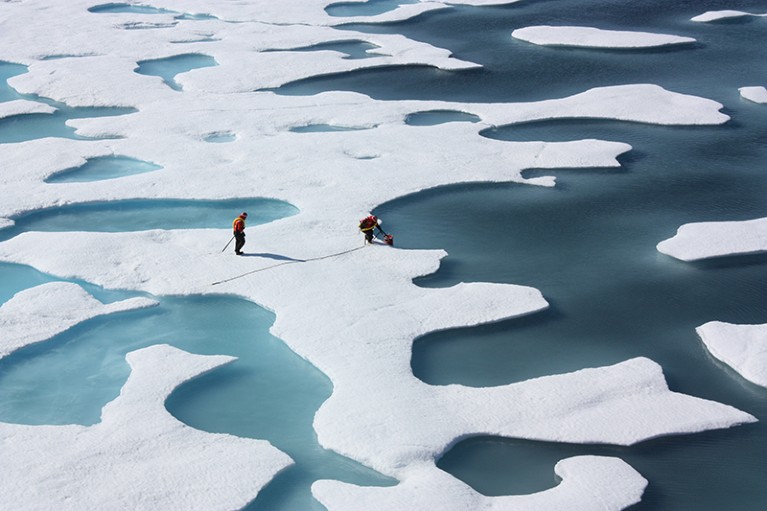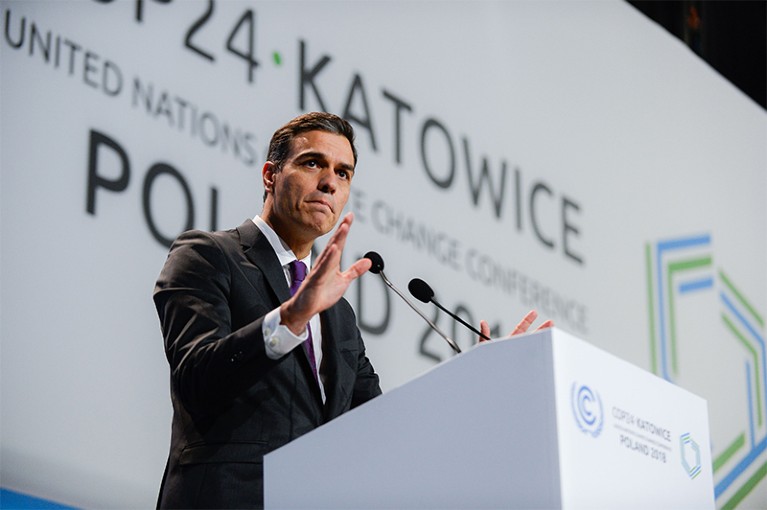CLIMATE CHANGE
Report flags trouble for the Arctic The Arctic experienced its second-warmest year on record between October 2017 and September 2018, according to a report released by the US National Oceanic and Atmospheric Administration on 11 December. Average air temperatures in this frigid region have hit record or near-record levels every year since 2014. And rising temperatures have contributed to more than a 50% decline in wild reindeer and caribou populations since the 1990s. Government researchers also reported that roughly 99% of sea ice is now considered relatively new, meaning that it hasn’t lasted for more than four summers without melting. It’s now the thinnest and most susceptible to warming temperatures that it’s been in 30 years.

Sea ice in the Arctic is thinner than it's been in decades.Credit: Kathryn Hansen/NASA
EVENTS
Students blocked Two more universities in Japan have admitted to systematically favouring male applicants to their medical degrees over women. On 10 December, Juntendo University and Kitasato University, both in Tokyo, posted statements on their websites acknowledging the practice. The revelations come four months after reports that Tokyo Medical University had been altering entrance-examination results for years to keep the proportion of female entrants below 30% of all students. A government investigation into whether the practice was used at other medical schools found that Juntendo University had unfairly assessed 164 applicants in 2017 and 2018. Of those, 117 who had failed medical-school exams on previous application attempts, including 74 women, were unfairly blocked from proceeding to the second stage of assessment. Another 47 women and one man who should have been accepted were denied entry. The university’s statement said it was compensating for the difference in emotional maturity between men and women at the age of college entrance. Kitasato University said it has launched an independent investigation into its own actions. Both universities have vowed to end the practice in 2019.
POLICY
Climate talks Delegates from nearly 200 countries have come to an agreement on how to implement the 2015 Paris climate accord. The deal, reached on 15 December at the United Nations climate summit in Katowice, Poland, establishes rules for tracking and reporting greenhouse-gas emissions and climate policies. It also lays out processes intended to boost national efforts to curb emissions and increase the transfer of money and technologies to developing countries. “The multilateral system has delivered a solid result,” UN climate chief Patricia Espinosa said in a statement. “This is a roadmap for the international community to decisively address climate change.”
EU science scheme The European Parliament has adopted proposals for Horizon Europe, the European Union’s next big research-funding programme, for 2021–27. The parliament proposed altering the way in which non-EU member states can participate in the scheme, which could benefit the United Kingdom after Brexit. One proposed category would include countries that are closely associated with the EU, such as Switzerland and Norway. A second tier would be for nations with looser ties. Britain’s category would depend on the access deal agreed with the European Commission after Brexit, said one of the parliament’s rapporteurs on Horizon Europe. But Britain will continue to be treated as a member state in negotiations until it leaves the EU. The parliament also voted to raise the scheme’s budget from nearly €100 billion (US$114 billion) to around €120 billion. The proposals must now go before the Council of the European Union.
Gene-editing rules An international agreement on standards for germline gene editing is needed urgently, said the presidents of the Chinese Academy of Sciences and the US National Academies of Sciences, Engineering, and Medicine in a 13 December essay (V. J. Dzau et al. Science 362, 1215; 2018). The call is in response to a widely condemned claim that a Chinese scientist used the CRISPR–Cas9 tool to edit genes in two human embryos, leading to the birth of twin girls last month. The essay calls for an expedited report from international science academies, which advise governments. It cites as a model the 1975 Asilomar Conference on Recombinant DNA, in which scientists established voluntary guidelines for safely working on the technology. Some researchers, however, contend that stricter, legally enforceable limits are needed on germline gene editing.
Science advice Spain is set to get an official science advisory panel that will gather scientific evidence on a range of technical and social issues for its lawmakers. The parliament’s lower house, the congress, designated €200,000 (US$227,000) of its draft 2019 budget on 3 December to creating an office of science and technology. It will be modelled on the UK Parliamentary Office of Science and Technology (POST), which provides evidence at early stages of political debates on scientific issues. The Spanish office will take a broader approach to science, also covering issues such as immigration and gender equality. The move follows a November meeting between parliamentarians and Science in the Parliament (Ciencia en el Parlamento), a grass-roots organization of scientists that has campaigned for such a body since late 2017. Ciencia has also acted as a voluntary, unofficial POST in Spain over the past few months, commissioning reports on 12 topics picked by parliamentarians from 50 themes that emerged from a wider public consultation.

Spanish Prime Minister Pedro Sanchez talking at the climate-change summit in Poland.Credit: Omar Marques/SOPA Images/Shutterstock
PEOPLE
Antarctic deaths Two fire technicians at the US National Science Foundation’s (NSF) McMurdo Station in Antarctica were pronounced dead on 12 December after an incident at a generator building. A helicopter pilot noticed what appeared to be smoke rising from the building and found the two people lying unconscious inside. It’s unclear what happened and the NSF says that an investigation is under way. The individuals, whom the NSF would not identify, had been testing the operation of the structure’s fire-suppression system. Medical personnel from the McMurdo clinic declared one of the workers dead at the scene. The other worker was flown to the McMurdo clinic and pronounced dead shortly thereafter.
FUNDING
NIH crackdown The US National Institutes of Health (NIH) is cracking down on private donations to research projects, following revelations earlier this year that researchers studying drinking had solicited funding from the alcohol industry in violation of NIH rules. The agency will review all projects receiving private funds to identify potential conflicts of interest, said deputy director Lawrence Tabak at a 13 December meeting of the agency’s Advisory Committee to the Director (ACD) in Bethesda, Maryland. In an effort to prevent NIH programme officers from favouring certain companies, the agency will also begin publicly disclosing more information about unsuccessful applications for partnerships, as well as how private funds are awarded. The NIH terminated the alcohol study in June after the ACD decided that its results could not be trusted.
FACILITIES
Fusion energy The United States should continue its participation in the international fusion-power project ITER while expanding its domestic research and development efforts in the field, says a report released on 13 December by the National Academies of Sciences, Engineering, and Medicine. The troubled multibillion-euro project has faced scepticism from members of the US Congress, but the United States has continued to contribute to the project. The country’s current budget includes US$132 million for ITER, an increase of $10 million from the previous year. To capitalize on that investment — and avoid being overtaken by other countries — the United States must also expand its domestic efforts to advance fusion energy, the report says. It recommends that the country increase its spending on fusion research by nearly $200 million annually for the next several decades, so that it can maintain its partnership in ITER and build its own pilot plant.
TREND WATCH
Global spending on tuberculosis (TB) research and development hit a high in 2017, according to a report from the activist organization Treatment Action Group (TAG) in New York City.
Investment reached US$772 million, up from $726 million in 2016. The hike follows two years of declines, in 2014 and 2015. It is the most spent on research into TB in a year, but still falls short of the $2 billion a year that the TB research community says is needed to end the disease by 2030. That target is one of the United Nations Sustainable Development Goals and part of the World Health Organization Global Plan to End TB.
Around 25% of the world’s population — 1.8 billion people — is infected with TB, the World Health Organization estimates. In 2017 alone, some 10 million people fell ill with the disease, and 1.6 million died.
The disease remains prevalent but science is generating hope that new and improved means of diagnosis, vaccination and treatment are on the horizon. “We’re at an incredibly promising moment in TB research globally,” says Mike Frick, TB project co-director for TAG.
2018-12-13 TW GRAPHIC




